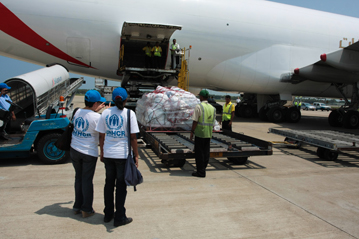Horn of Africa: humanitarian situation still precarious
Horn of Africa: humanitarian situation still precarious
At least five Eritrean families were reported by refugees to have returned spontaneously on Monday to Eritrea from Gulsa camp in Sudan following the signing of the peace agreement in Algiers by Eritrea and Ethiopia on Sunday. Refugees and Sudanese authorities say that Ethiopian troops on the Eritrean side of the border were withdrawing this morning. However, we have no independent confirmation of this report. Many refugees say they want to return as soon as possible but this will depend on the security situation in their villages in Eritrea. In fact, Eritreans continue to trickle into Sudan. Around 250 Eritreans arrived on Monday at Gulsa and Lafa camps in Sudan - mainly people who had been in the bush for some time and who had run out of supplies.
UNHCR on Monday completed the transfer of more than 15,000 Eritrean refugees from Gergef camp at the Sudanese border to Shagarab, about 70 km inside Sudan. A total of 15,690 refugees had been moved from Gergef to Shagarab over the past two weeks.
UNHCR has registered 93,488 Eritreans in Sudan since the refugee influx began in mid-May, but there had been double registration and there had been some returns to Eritrea. A census is being planned to determine the exact number of refugees in the camps.
In Eritrea, despite the Algiers peace deal, the humanitarian situation on the ground continues to be precarious. Relief agencies believe a speedy withdrawal by Ethiopian forces from Eritrea's western lowlands - the country's breadbasket - is crucial to enable Eritrea's displaced rural population to return to their fields and sow crops. The next few weeks will make the difference between a satisfactory harvest and the threat of hunger in a country where more than 300,000 people were already affected by a severe drought.
UNHCR is worried by reports that 15,000 people have been expelled from their homes in the Gash Setit region in western Eritrea, which is occupied by the Ethiopian forces. UNHCR has requested permission from the Eritrean government to travel to the former frontline area to verify the reports and assess the humanitarian needs of the displaced. If confirmed, the expulsions could have an additional adverse effect on Eritrea's next harvest.
UNHCR is helping to address emergency needs with a fleet of 40 heavy trucks and 20 trailers. We are also airlifting tipper trucks into Asmara later this week. A UNHCR-chartered Boeing 707 is currently airlifting 86,000 blankets to Asmara from Nairobi.









